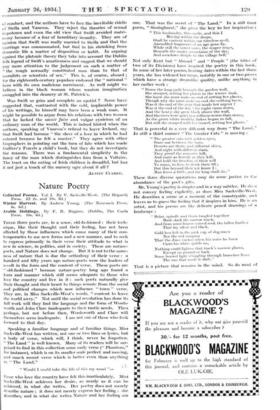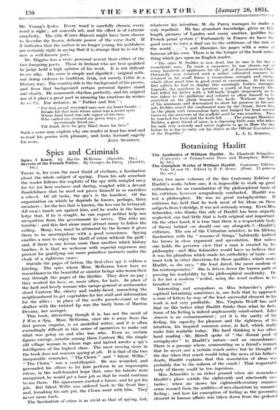Nature Poetry
THESE three poets are, in a sense, old-fashioned : their tech- nique, like their thought and their feeling, has not been affected by those influences which cause many of their con- temporaries to use new forms and a new manner, and to seek to express primarily in their verse their attitude to what is new in science, in politics, and in society. These are nature- poets, and Nature does not change. But it is not to the same- ness of nature that is due the orthodoxy of their verse : a hundred and fifty years ago nature-poets were the leaders of revolt in the form and the content of verse. These poets are " old-fashioned " because nature-poetry long ago found a form and manner which still seems adequate to those who love the country and live in it : such poets naturally give their thought and their heart to things remote from the social and political changes which now influence " town " verse. They are, in Miss Saekville-West's words, " content to leave the world awry." Not until the social revolution has done its full work will they fmd the language and the form of Words- worth and John Clare inadequate to their rustic needs. Then perhapS, but not before then, Wordsworth and Clare will themselves seem inadequate. I am not one of those who look forward to that day.
Speaking a familiar language and of familiar things, Miss Saekville-West has written, not one or two lines or lyrics, but a body of verse, which will, I think, never be forgotten. " The Land " is well known. Many of its readers will be sur- prised to find in this collection some early verse (" Phantom," for instance), which is on its smaller scale perfect and moving, and much recent verse which is better even than anything in " The Land."
"`Would I could take the life of this my wood "— those who love the country have felt this inarticulately. Miss Sackville-West achieves her desire, as nearly as it can be achieved, in what she writes. Her poetry does not merely describe nature ; it does not merely express her feeling : she describes, and in what she writes Nature and her feeling are one. That was the secret of " The Land." In 'a still liner poem, " Sissinghurst," she gives the key to her inspiration : " This husbandry, this castle, and this I Moving within the deeps. Shall be content within our tuneless spell, Assembled fragments of an ago gone by, While still the sower sown, the reaper reaps, Beneath the snowy mountains of the sky. And meadows dimple to thu village bell."
Not only Kent but " Abroad " and " People " (the titles of two of its Divisions) have inspired the poetry in this book. In some of her later poems, bearing dates within the last three years, she has widened her range, notably in one or two pieces which have a strange dreamlike quality, unlike anything in her earlier work :
" Down the long path beneath the garden wall, She stooped, setting her plants in the winter dusk. She knew she must make an end of setting her plants, Though why she must make rut end she nothing knew.
Was it the end of the year that made her urgent ?
Was it the end of tho day ? for night came down, And the heavy sky grew black above the wall, And the trees were quiet in a stillness worse than storm, As the great white stealthy flakes began to fall, But still she stooped with her trowel, setting her plants."
That is powerful in a very different way from " The Land." In still a third manner " The Greater Cats " is moving :
The greater cats with golden eyes, Stare out between the ham.
Deserts aro there, and different skies, And night with different stars.
They prowl the aromatic hill,
And mato as fiercely Its they kill,
And hold the freedom of their will To roam, to live, to drink their fill ; But this beyond their wit know I : Man loves a little, and for long shall die."
These three diverse quotations may do some justice to Ilse abundance of the poet's gifts.
Mr. Young's poetry is simpler and in a way subtler. He does not convey feeling explicitly, as does Miss Sackvillc-West. Ile describes a scene or a moment of the countryside, ana leaves us to guess Ihe feeling that it inspires in him. lie is an artist, and his poems are like delicate pencil drawings of a landscape :
" Briar, spindle and thorn tangled together
the narrow track,
Made dark
And from Homo voiced rook the fallen feather That lay silent and t black.
Cold lees left in the pink cup of dog-roses Nor the red r81110011
That the June cuckoo when his voice he loses Casts his white spittle on, Nothing could lighten that track's narrow gloom, Except on ground or bark
Some honied light straggling through branches from The suit that made it-dark."
That is a picture that remains in the mind. So do most of
Mr. Young's -lyrics. Every word is carefully chosen; every word is right ; art conceals art, and the effect -is of extreme
simplicity. The title ',Tinter Harvest might have been chosen to describe the frozen, delicate power of the verse itself. If it indicates that the author is no longer young, his publishers are certainly right in saying that it is Strange that he is not by now a well-known poet.
Mr. Higgins has a more personal- accent than either of the two foregoing 'poets. Those in Ireland who are best qualified to judge hold a high opinion of his work. It is not difficult to see why. His verse is simple and dignified ; original with- out doing violence to tradition, Irish, not merely Celtic in a literary way. The countryside is the background of his poems; and from that background certain personal -figures stand out clearly. He commands rhythm perfectly, and his original use of it plays a great part in arousing the emotions he wishes to evoke. For instance, in " Father and Sion " :
" For that proud, wayward man now my-heart breaks— Breaks for that man whose mind was a secret eyrie Whose kind hand was sole signet of his race, Who curbed me, scorned my green ways, yet
increasingly loved me, Till death drew its grey blind down his face."
Such a verse may explain why one reader at least has read and re-read his poems with pleasure, and looks forward eagerly











































 Previous page
Previous page